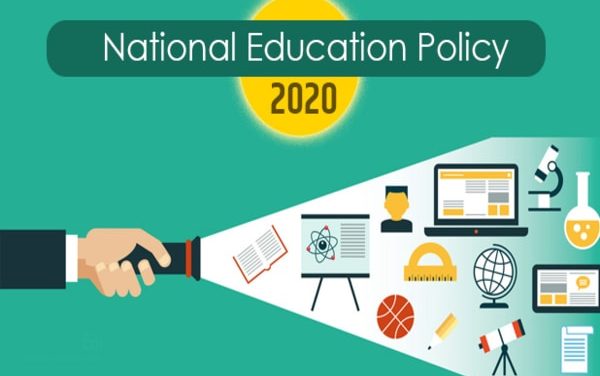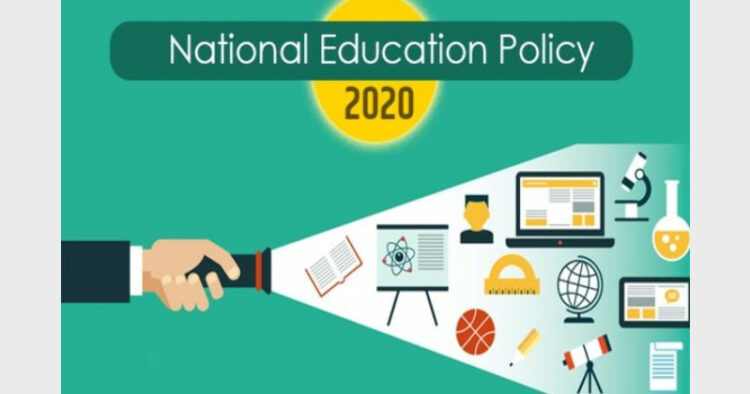
Sabareesh P A
As the world becomes borderless, global standards set the game rolling in creating new paradigms towards efficiency, and that is precisely the roadmap that the NEP 2020 lays forward.
Dr K. Kasturirangan in June 2019, as the chairperson of the committee drafting the National Education Policy, specified in an interview that India’s education structure needs no fine-tuning but a definite ‘change in totality’. 1968was the year when the Government of India introduced the first policy for education. The second education policy followed in 1986. The Union Cabinet on 29th July 2020 approved the National Education Policy (NEP) – 2020 which has come after 34 years. The NEP 2020 has called for ‘transformational reforms’ in school & higher education sectors and vouches for access, equity, quality, affordability and accountability in education which is in accordance with the Sustainable Development Goals 2030. The NEP has envisioned to transform India into a self-sufficient global knowledge economy through a holistic, flexible and multidisciplinary education system that suits its challenging needs of the 21st century.
Anxiety in Parents, Teachers and Trainers:
Over the last couple of days, a lot of anxious questions have raised from parents, teachers and educational trainers alike as to how the NEP 2020 will unfold in theirs and student’s lives. A question frequently put forward by anxious parents is of this nature: my daughter is in her 9th standard, my son is in 11th standard and would the NEP affect their curriculum and board exam scores? Another middle-aged teacher working in a private school asked, how to adapt creative teaching methods to stay competitive in the new education phase? The fact is that it is too early to answer these questions. The policy document has only spoken about the comprehensive framework or the foundational idea. The centre and state governments are expected to ‘concurrently’ come up with the detailed guidelines for training the teachers, jointly prepare academic curriculum and several other rules and regulations that will provide the greater subjective understanding and bring further clarity to the National Education policy 2020.
Pouring oil to the fire are those who have not assessed the long term positive impact that the NEP 2020 could have on India’s education system. Let’s be open for endless constructive criticism instead of taking a destructive critique of the NEP.To self-assume that NEP will bring sudden and drastic changes in the ongoing curriculum due to parenthood anxiety or lockdown, loneliness does not hold logic. But one thing is for sure: there is undoubtedly going to be an overall ‘change’ in India’s education system in a phase-wise manner. I think this sounds sensible enough given the mammoth task of restructuring a colonial-era educational system to a futuristic one amidst infrastructural constraints. In fact, the government has set a target of 2040 to implement the entire policy.
Let’s talk about ‘change’- which the human mind tries to avert at the psychological level. Human history has several examples wherein empires, societies, organisations, economies, business enterprises and even individual leaders being gradually phased out for not having adapted themselves or their entities to the changing scenarios or for having shown a total aversion to change. The advent of information technology has multitudinously fastened this ‘phasing out’ of outdated thought processes and uncompetitive organisational structures to give way for creative thinking and ‘disruptive’ innovation-led development. This is simply because old and static ideas no more work for today’s’ dynamic world. Moreover, the rapidly increasing applications of artificial intelligence, big data and machine learning have furthered the necessity to think in a multidisciplinary approach for complex problem-solving. It is therefore important to point out that the NEP 2020 emphasises on introducing multidisciplinary studies and critical thinking approaches at the school and college level academic curriculum. In the years to come the outcomes of having adopted critical thinking at a multidisciplinary level shall surely enable India to improve the skill and problem-solving capabilities of its populace. So to proactively be willing to adapt to the gradual upcoming changes in the national education system as envisioned by the NEP would be our bit of contribution towards the foundational roadmap to a self-reliant India -Atmanirbhar Bharat.
Essential highlights of the NEP 2020:
1. Universal access to school education at all levels through infrastructure support, innovative education centres, open schooling, vocational courses apart from other support.
2. Early childhood care through replacement of 10 + 2 school curriculum with a 5 + 3 + 3 + 4 curriculum for the age groups of 3-8, 8-11, 11-14 and 14-18 respectively. This shall enable the pre-schooling of children during their crucial 3-6 age group thereby enabling the development of mental faculties, play/activity-based thinking and learning of the child through the proposed National Curricular and Pedagogical Framework for Early Childhood Care and Education (NCPFECCE).
Early childhood education will emphasise on (a) developing curiosity (b) logical thinking and problem solving (c) arts, crafts and music (d) relationship with nature (e) colours, shapes, alphabets and numbers (d) teamwork and collaboration (e) play-based and discovery-based learning (f) ethics (g) self-identity (h) etiquette, behaviour and emotional development. This will be implemented by strengthening institutions, including Anganwadi and pre-schools with teachers trained in the new syllabus.
3. National Mission on Foundational Literacy and Numeracy for primary schools for all learners by grade 3 by 2025.
4. Holistic revamping of school curriculum and pedagogy according to 21st-century skills and requirements through reduced curricular content yet enhanced critical thinking and a greater focus on practical learning. Towards this, choice of subjects together with increased flexibility has been given and rigidity between arts – science, curricular – extracurricular and distinguishing of vocational – academics have been diluted. This aims for laying the foundation towards multidisciplinary and flexible learning from the school level.
5. NEP 2020 has laid emphasis on native language or mother tongue as the medium of teaching and instruction till Grade 5. Sanskrit and other classical languages as an option at all levels of school and higher education; foreign languages from secondary level to enhance lingual skills of students which opens the scope towards a lingua-cultural mind of the student. Standardisation of Indian Sign Language across the country aimed at developing curriculum for divyang students with hearing impairment.
6. Reforms in academic assessment that emphasise on competency, promote learning and development, testing analytical skills, critical thinking and conceptual clarity. School examinations in Grades 3, 5 and 8 with a redesigned holistic assessment for 10 and 12 board exams. Towards setting standards in this regard PARAKH – ‘Performance, Assessment, Review, and Analysis of Knowledge for Holistic Development’ will function as a new National Assessment Centre.
7. Equitable and inclusive education for every child to learn and excel irrespective of circumstances related to birth or socio-economic or geographical background. Gender Inclusion Fund and Special Education Zones for disadvantaged regions and groups to be set up in this regard.
8. National Professional Standards for Teachers (NPST) for robust teacher recruitment and career path.
9. Increasing Gross Enrolment Ration from 26.3% to 50% by 2035. Target addition of 3.5 crore seat to higher educational institutions.
10. Multidisciplinary education through flexible curriculum, combination of subjects, vocational education and training for undergraduate courses with multiple exit options with ‘appropriate certification’ after every year i.e. the student will be an eligible Certificate holder after 1 year, Advanced Diploma after 2 years, Bachelor’s Degree after 3 years and Bachelor’s with Research after 4 years. Establishment of Multidisciplinary Education and Research Universities (MERUs) with global standards at par with IITs, IIMs. This would benefit students aiming at selective learning, certification and securing early employment opportunities.
11. Establishing a National Curriculum Framework for Teacher Education – NCFTE 2021 towards enhancing teaching standards and recruitment. Four year integrated multidisciplinary course/training for teacher recruitment. National Mission for Mentoring through senior/retired faculties for providing mentoring to university and college teachers.
Subjective Analysis:
The need for creative thinking, critical analysis and innovative solutions has been continually rising in today’s globalised and competitive world. As the world becomes borderless, global standards set the game rolling in creating new paradigms towards efficiency, which is emphasised in the NEP 2020. Therefore the need to set higher standards in skilling and training by ensuring the multi-faceted framework through vocational and multidisciplinary education is the need of the hour. This would pave the way for competitive advantage in global markets for India.
The policy sets the way for interactive and practical classrooms as a policy mandate. The challenges in this regard are going to be infrastructure up-gradation and much importantly attaining global infrastructural standards in the long term. India has a history of falling back on infrastructure development deadlines in the urban and rural areas. But the lessons learnt during the COVID-19 pandemic assert the need for constant up-gradation of amenities and facilities: physical and digital in rural and urban. The task of recruiting and training, upgrading teaching and presentation skills of teachers is going to be an ‘Everest’ challenge. It would demand a paradigm shift from what is ‘decades of soaking’ in a static and repetitive academic module towards the proposed dynamic, holistic, multidisciplinary and extended spell of action.
It is undoubtedly true that a good vision for school education can positively lay the foundation for higher education on the lines of multidisciplinary and further to trans-disciplinary with a shared focus on science, arts and humanities. The NEP – 2020 is going to put to test the political leadership, bureaucrats, administrators, policymakers, teachers, parents and other stakeholders of their willingness and proactiveness enroute a mammoth task of upgrading the very definition and scope of ‘studentship’ for the envisioned Atmanirbhar Bharat.
(The writer is currently a Research Scholar at the Centre for Studies in Science Policy (CSSP), Jawaharlal Nehru University, New Delhi.)














Comments